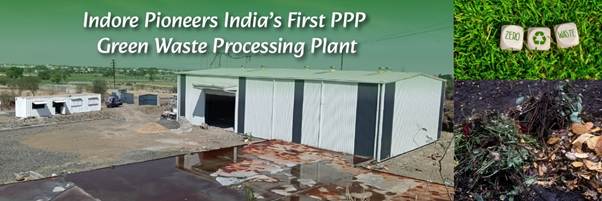Indore to set up India’s First PPP Green Waste Processing Plant

IN NEWS
Indore to set up India’s First PPP Green Waste Processing Plant
Analysis
- Context and Significance
- Indore, under the Swachh Bharat Mission–Urban (SBM-U), is launching India’s first Green Waste Processing Plant developed under a Public-Private Partnership (PPP) model.
- This marks a significant step in sustainable urban waste management, promoting circular economy practices and environmental innovation.
- Project Overview
- The plant is being developed by Indore Municipal Corporation (IMC) in collaboration with Astronomical Industries Pvt. Ltd.
- Located at Bicholi Hapsi, the facility spans 55,000 sq. ft. and will process wood, branches, leaves, and flowers generated as green waste in the city.
- Indore generates around 30 tonnes of green waste daily, which can increase up to 60–70 tonnes during autumn.
- Revenue and Economic Aspects
- IMC will earn approximately ₹3,000 per tonne as royalty for supplying wood and branches.
- The project demonstrates how waste can be turned into a valuable resource while creating new revenue streams for municipal bodies.
- Technology and Processing Method
- The plant will recycle wood and branches into wooden pellets, serving as an eco-friendly alternative to coal, thereby promoting energy conservation.
- The waste will be dried for three to four months to reduce moisture content by 90%, before being converted into fine sawdust using advanced machinery.
- The sawdust can be used across sectors — as fuel, packing material, composite furniture material, biodegradable plates, and fertilizers.
- Operational Model
- IMC: Responsible for land provision and waste collection/transportation.
- Private Partner: Will handle infrastructure setup (sheds, electricity, water), machinery installation, and plant operations.
- This model showcases an effective PPP approach to sustainable urban governance.
- Environmental and Urban Impact
- The initiative aligns with the Garbage-Free Cities vision under SBM-U.
- Helps control AQI by reducing open burning of waste and pollution.
- Supports waste-to-wealth conversion, enhances urban hygiene, and boosts green energy adoption.
- Broader Waste Management Ecosystem
- Other private plants like Meghdoot and Sub-grade units in Sirpur also process garden waste for composting.
- Compost pits within municipal gardens enhance organic waste recycling and soil health.
- The wooden pellets produced are used by industries like NTPC, contributing to cleaner energy generation.
- Strategic Outcomes
- Encourages resource efficiency, sustainable energy alternatives, and urban climate resilience.
- Demonstrates a scalable model for other Indian cities aiming for integrated solid waste management.
Static Information
- Swachh Bharat Mission–Urban (SBM-U):
A flagship initiative by the Ministry of Housing and Urban Affairs (MoHUA) launched in 2014 to eliminate open defecation and improve solid waste management in urban areas. - Public-Private Partnership (PPP):
A cooperative arrangement between public and private sectors for financing, building, and operating projects that serve the public. - Circular Economy Concept:
Focuses on reducing waste by reusing, recycling, and regenerating materials to create a closed-loop system, minimizing resource input and environmental impact.
Updated - 18 Mar 2025 ; 04:42 PM | PIB
[News Source: PIB]